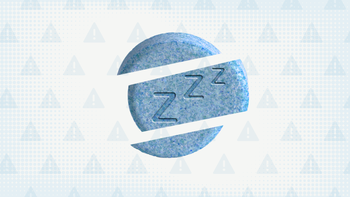melatonin
Melatonin is a supplement that's taken to help with sleep problems due to conditions like insomnia or jet lag. It's available over-the-counter and comes in many different formulations, including oral pills and sprays, skin patches, and topical creams. Various melatonin products have different instructions and age recommendations, so speak with your provider or pharmacist to check if it's safe for children. Melatonin is pretty well tolerated, but possible side effects include daytime sleepiness, headaches, and nausea.

What is Melatonin?
What is Melatonin used for?
How Melatonin works
Melatonin is a supplement. It's a synthetic (man-made) version of a naturally occurring hormone made by your brain. Your body makes more melatonin when it's dark, and this tells your body it's time to sleep. If you don't have enough melatonin, you might have trouble sleeping. Taking melatonin might help some people fall asleep faster and stay on a regular sleep schedule.
Drug Facts
More on Melatonin essentials

Get your GoodRx coupon

What are the side effects of Melatonin?
Common Side Effects
- Drowsiness
- Daytime sleepiness
Other Side Effects
- Headaches
- Nausea
- Nightmares
- Bedwetting (in children only)
Source: DailyMed
More on Melatonin side effects
The following side effects have also been reported
Side effects that you should report to your care team as soon as possible:
- Allergic reactions—skin rash, itching, hives, swelling of the face, lips, tongue, or throat
- Mood and behavior changes—anxiety, nervousness, confusion, hallucinations, irritability, hostility, thoughts of suicide or self-harm, worsening mood, feelings of depression
Side effects that usually do not require medical attention (report to your care team if they continue or are bothersome):
- Bedwetting in children
- Dizziness
- Drowsiness the day after use
- Headache
- Nausea

Pros and cons of Melatonin

Pros
Generally well tolerated with very few side effects
Usually not habit-forming like some other sleep aids
Available over the counter (OTC) in many different dosage forms and strengths
Available as a lower-cost generic

Cons
Might not contain the correct amount of active ingredient since it's not as regulated by the FDA
Can cause daytime drowsiness in older adults
Unknown whether it's safe for long-term use
Shouldn't be used as a first-choice option to treat insomnia

Pharmacist tips for Melatonin

Melatonin is a supplement, not a medication. FDA regulations for supplements are less strict, so companies don't have to prove safety and efficacy to the same degree as prescription or OTC medications. Talk to your provider before using melatonin or any new product.
Melatonin comes in many different dosage forms and strengths. Choose a reputable product by making sure there is a USP-verified label on the bottle.
Melatonin can interact with certain medications like oral contraceptives. Ask your pharmacist about medication interactions before you start taking melatonin.
Melatonin isn't recommended for people with dementia, and it can lead to more side effects in older adults, like daytime sleepiness. Talk to your provider before taking melatonin to avoid any potential side effects.
Melatonin causes drowsiness and sleepiness. Don't drive, operate machinery, or participate in activities that require alertness while taking this product until you know how it affects you.
More on Melatonin tips

Frequently asked questions about Melatonin

How to save using GoodRx




What are the risks and warnings for Melatonin?
Melatonin can cause some serious health issues. This risk may be even higher for certain groups. If this worries you, talk to your doctor or pharmacist about other options.

Worsening of certain medical conditions
Risk factors: Bleeding disorder | Low blood pressure | Seizure conditions | Depression
Melatonin can make certain medical conditions worse. These medical conditions can include bleeding conditions, low blood pressure, seizure conditions, and depression. Talk to your provider if you have any medical conditions before starting melatonin.

Overdose in children
Risk factors: Easy access to melatonin inside the home
Intentional or accidental overdose with melatonin is a possibility. This can be serious and result in hospitalization. Be sure your child doesn't have access to this medication without adult supervision.

Interactions with other medications
Risk factors: Taking multiple medications
Melatonin can interact with many medications, including oral contraceptives, blood pressure and diabetes medications, and transplant medications. Be sure you have a full list of all the medications you take to show your provider or pharmacist. This way, they can check for any potential interactions between your medications and melatonin.
More on Melatonin warnings

Melatonin dosage forms
Typical dosing for Melatonin
Your dose will vary based on your age and how you respond to the product.
Adults: The typical dose is up to 8 mg by mouth a day for up to 6 months.
Children: The typical dose is up to 3 mg by mouth a day for up to 3 months.
More on Melatonin dosage forms

How much does Melatonin cost?

Melatonin contraindications
Currently breastfeeding

What are alternatives to Melatonin?
Allergies
Common cold symptoms
Trouble sleeping for people 12 years and older
Trouble falling asleep (insomnia)

What is the latest news about Melatonin?
Get savings updates for Melatonin
Receive price alerts, news, and other messages from GoodRx about Melatonin and other healthcare topics and relevant savings offers.By providing your email, you consent to receive marketing communications from GoodRx, which may include content and/or data related to men’s health, women's health, reproductive care, or sexual health. You agree to the GoodRx Terms of Use and acknowledge the Privacy Policy. You can unsubscribe at any time.
References
Best studies we foundDietary Supplement Label Database. (n.d.). Melatonin. National Institutes of Health, Office of Dietary Supplements.
Lelak, K., et al. (2022). Pediatric melatonin ingestions — United States, 2012–2021. Morbidity and Mortality Weekly Report.
MedlinePlus. (2023). Melatonin.
National Center for Complementary and Integrative Health. (2022). Melatonin: What you need to know.
National Organization for Rare Diseases. (2017). Non-24-hour sleep-wake disorder.
Safrel Pharmaceuticals, LLC. (2020). Safrel melatonin- melatonin tablet [package insert]. DailyMed.
Sateia, M. J., et al. (2017). Clinical practice guideline for the pharmacologic treatment of chronic insomnia in adults: An American Academy of Sleep Medicine clinical practice guideline. Journal of Clinical Sleep Medicine.
Savage, R. A., et al. (2022). Melatonin. StatPearls.
Stiegler, P., et al. (2018). Impact of melatonin in solid organ transplantation-Is it time for clinical trials? A comprehensive review. International Journal of Molecular Sciences.
U.S. Food and Drug Administration. (2022). FDA 101: Dietary supplements.
Compare other Insomnia drugs
Browse medications
View AllResearch prescriptions and over-the-counter medications from A to Z, compare drug prices, and start saving.




















